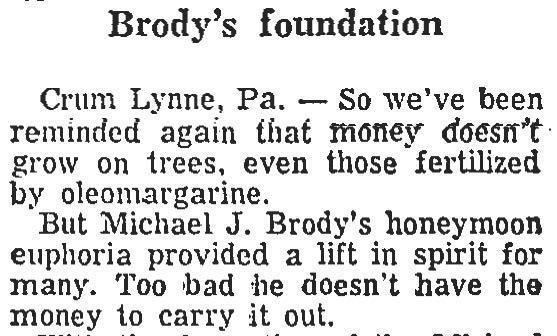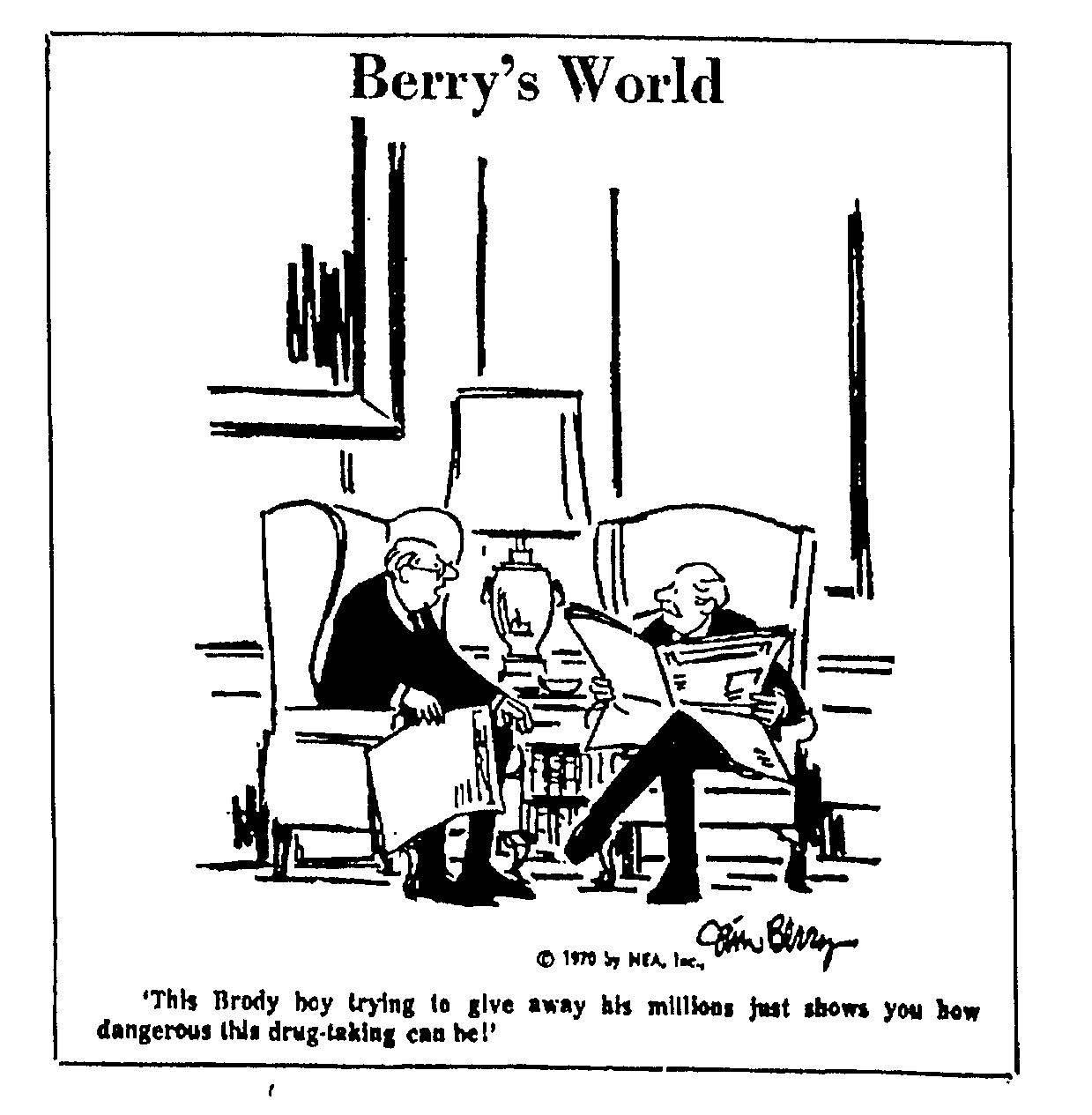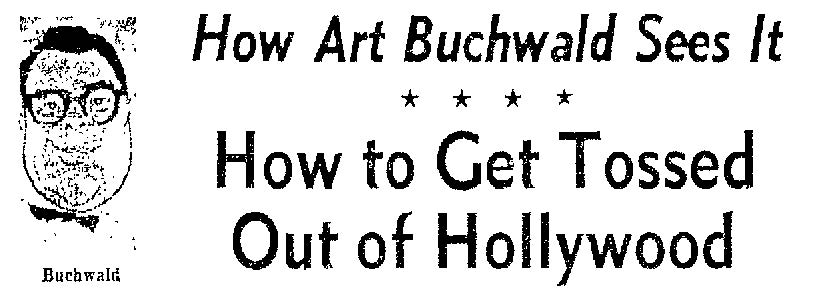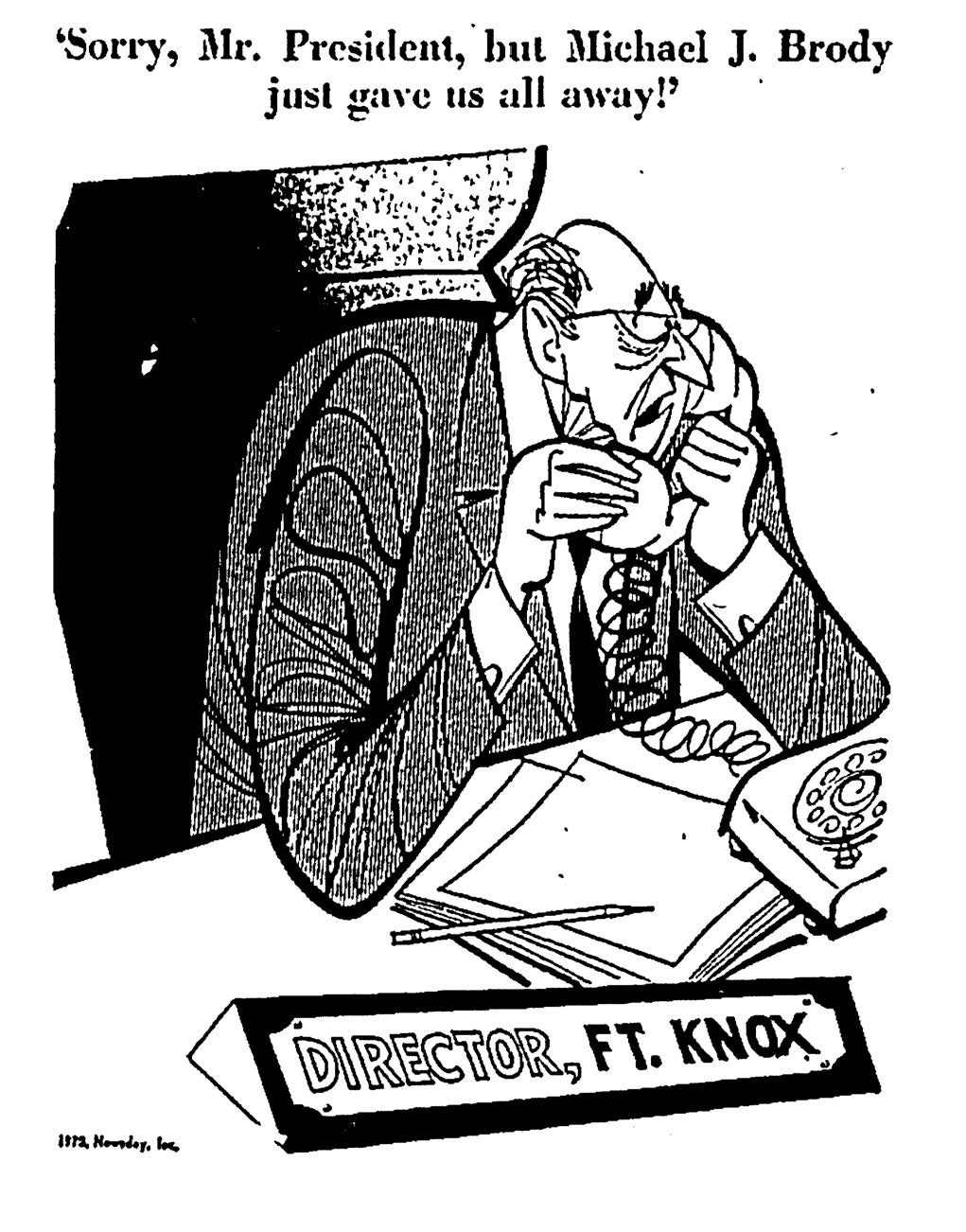•••
A Lousy Joke
 By the time Brody woke up on January 20 in New York City, the media backlash was in full force. The wire services had plucked Nancy Moran’s article in the New York Times for the delicious details. The questions about the size of Brody’s fortune led many of the pieces. And of course all of the pieces repeated what Brody had told Moran: that he had conceived of the giveaway “while tripped out on drugs.” The stories indicated that both Brody and Renée had been using drugs—marijuana, hashish, amphetamines and LSD—for years. But there was another tasty morsel. All of the initial stories about the newlyweds that appeared after the Boeing 707 touched down mentioned that they had met less than three weeks before they wed. It was a whirlwind romance with an elopement and a quick jaunt to Jamaica for the honeymoon. All this was known, but Moran had written about how they had met, and the wire stories found delight in that first encounter. Renée had gone to Brody’s Scarsdale house to sell him some hashish. One newspaper sarcastically commented on the front page that their marriage was “the great American modern day love story. She met him when she went to the door of his $90,000 rented home to sell dope.”
By the time Brody woke up on January 20 in New York City, the media backlash was in full force. The wire services had plucked Nancy Moran’s article in the New York Times for the delicious details. The questions about the size of Brody’s fortune led many of the pieces. And of course all of the pieces repeated what Brody had told Moran: that he had conceived of the giveaway “while tripped out on drugs.” The stories indicated that both Brody and Renée had been using drugs—marijuana, hashish, amphetamines and LSD—for years. But there was another tasty morsel. All of the initial stories about the newlyweds that appeared after the Boeing 707 touched down mentioned that they had met less than three weeks before they wed. It was a whirlwind romance with an elopement and a quick jaunt to Jamaica for the honeymoon. All this was known, but Moran had written about how they had met, and the wire stories found delight in that first encounter. Renée had gone to Brody’s Scarsdale house to sell him some hashish. One newspaper sarcastically commented on the front page that their marriage was “the great American modern day love story. She met him when she went to the door of his $90,000 rented home to sell dope.”
Two companion pieces appeared that morning in the New York Post. The first, entitled “Mike Brody: Nice Kid but Flaky” detailed Brody’s spoiled upbringing. He had flunked out of a toney prep school in New Jersey. He moved back to attend public school, where he was known as the rich kid whose mother had died. He always had a new sports car but he was irresponsible. He forgot to change the oil on his Jaguar and burned up the motor. A couple of days later he was driving around in a Lotus, but that lasted only a few weeks before he purchased a Thunderbird. He eventually graduated from Scarsdale High School. His photo in the high school yearbook showed a serious young man with short hair. “I play the game of life with a strong heart” was the caption. He attended a community college in Miami for a few weeks before dropping out. He enrolled at Butler University. He had given up the short hair and prep-school conformity. His hair was below the collar and he was wearing a leopard skin vest and other hippie-style clothes. He had picked up a yellow Corvette Stingray and a motorcycle. A few semesters later, Brody decided to transfer to the University of Colorado. And a semester and a half later, he dropped out and returned to Scarsdale to await his inheritance. The second article focused on Renée. Entitled “…And His Quiet Little Bride,” it was kinder, recounting her blue collar roots and her independent but quirky nature. She was a smart girl, an indifferent student but very much a lost soul. Like her husband, she was a college dropout and a drug user. And some reporters were following a lead that Renée had been on parole when she first met Brody—something about a shoplifting charge.
 Political cartoonists had also weighed in, focusing on Brody’s wild promises. Long Island’s Newsday contained a cartoon depicting a man in a business suit speaking on the telephone. The name plate on the businessman’s desk identified him as the director of Ft. Knox, where the United States gold reserves are housed. The caption read: “Sorry, Mr. President, but Michael J. Brody just gave us all away!” Its exact political context has been lost to history. Most likely, the cartoon commented upon the federal budget that Nixon was in the process of formulating. The cartoon would be widely re-published, including in Time magazine. A cartoon by Paul Conrad with a similar theme appeared in the Los Angeles Times. It showed Nixon leaning out of the second story of the White House. Below him were political supplicants and lobbyists, with their palms out or holding their hats open, waiting for money to come their way. “Who do you think I am…Michael J. Brody?” Nixon asked in the caption. This cartoon was also republished in various newspapers across the country. Jim Berry, whose strip, “Berry’s World,” ran for over twenty years in wide syndication joined the fray a few days later. His cartoon showed two middle-aged business men in suits reclining in wingback chairs, no doubt at some sort of private club. Each held a newspaper. “This Brody boy trying to give away his millions just shows you how dangerous this drug-taking can be!” said one man. One pundit claimed that Nixon refused to see Brody because the President either did not want anyone to show the government new methods of giving money away or did not want to pay for Brody’s cab fare.
Political cartoonists had also weighed in, focusing on Brody’s wild promises. Long Island’s Newsday contained a cartoon depicting a man in a business suit speaking on the telephone. The name plate on the businessman’s desk identified him as the director of Ft. Knox, where the United States gold reserves are housed. The caption read: “Sorry, Mr. President, but Michael J. Brody just gave us all away!” Its exact political context has been lost to history. Most likely, the cartoon commented upon the federal budget that Nixon was in the process of formulating. The cartoon would be widely re-published, including in Time magazine. A cartoon by Paul Conrad with a similar theme appeared in the Los Angeles Times. It showed Nixon leaning out of the second story of the White House. Below him were political supplicants and lobbyists, with their palms out or holding their hats open, waiting for money to come their way. “Who do you think I am…Michael J. Brody?” Nixon asked in the caption. This cartoon was also republished in various newspapers across the country. Jim Berry, whose strip, “Berry’s World,” ran for over twenty years in wide syndication joined the fray a few days later. His cartoon showed two middle-aged business men in suits reclining in wingback chairs, no doubt at some sort of private club. Each held a newspaper. “This Brody boy trying to give away his millions just shows you how dangerous this drug-taking can be!” said one man. One pundit claimed that Nixon refused to see Brody because the President either did not want anyone to show the government new methods of giving money away or did not want to pay for Brody’s cab fare.
 Humor columnists also found Brody great source material. Noted columnist Art Buchwald penned a story about two screen writers, Sam and Al, trying to pitch the Brody story, to J.B., a Hollywood studio head. Buchwald was widely syndicated and the article appeared in papers across the country under various titles:
Humor columnists also found Brody great source material. Noted columnist Art Buchwald penned a story about two screen writers, Sam and Al, trying to pitch the Brody story, to J.B., a Hollywood studio head. Buchwald was widely syndicated and the article appeared in papers across the country under various titles:
“J.B. we have this great idea for a movie. Tell him, Al.”
“Well, J.B., it’s about this 21-year old kid who plays a guitar and has long hair and believes everyone should love each other. He inherits $25 million from his grandfather, who invented a butter substitute.”
J.B. tries to throw them out.
“Wait a minute, J.B., There’s more to it than that. He walks down the street handing out thousands of dollars to anyone he likes. Pretty soon, there’s an army of people trying to get to him for schemes they want financed.”
As they tell the story, J.B. yells at them to get out of his office.
“He holds a press conference and announces he has the solution to the Vietnamese war.”
J.B. clenches his fist. “How the hell did you guys get into my office in the first place.”
“Sam, tell him what happens next.”
Sam and Al continue to tell the story—of the crowds seeking money, and Brody’s turning on the supplicants because of their greed. J.B. calls for the studio police.
“J.B. this could be a great movie. Bigger than ‘Easy Rider.’ The guy’s so sore at the people that he hires a plane and flies to the Caribbean with a plane load of reporters. But he can’t find any peace there either. So he flies back to New York and decides to make a record about peace.”
“Now this is the part you’re going to like, J.B. It’s the finish to end all finishes. Tell him, Sam.”
“The Guy goes on the Ed Sullivan Show!”
The studio chief is beside himself.
“Can’t you see it, J.B.? The whole country is watching him and he tells them that money isn’t everything and the most important thing is to have good vibrations.”
J.B. gets up from his chair. “OUT!!! OUT!!!”
The studio police start dragging the writers out of the office. Al yells:
“Now for the switch at the end. The guy doesn’t have $25 million—he only has a lousy $4 million so everyone gets sore at him, and he finally discovers that you can’t buy love.”
As they are being dragged down the hall, Sam cries.
“All right. If you think it’s too farfetched, we’ll take out the part about him
going on the Ed Sullivan show.”
Comedians discovered that the Brody escapade was fertile ground. At first, stand-up comics worked jokes into their monologues about those seeking donations from Brody. In January 1970, Flip Wilson was perhaps the hottest comic in America. He was 10 months from starting his hit NBC show. Two days before Brody’s jaunt to the White House, Wilson added a joke about the lines of money seekers to his routine. “All those cats lined up to ask for a handout are weird and greedy.” Flip said. “And rude too—I got pushed out of the line twice.” As the story changed from the giveaway promise to Brody’s drug use and the size of his fortune, “café comics” switched the focus of their jokes from the money seekers to “kooky mini-philanthropist Michael Brody.” And the jokes were hardly confined to backroom comedy clubs or coffee bars. Noted comedian Bob Hope set his sights on Brody, adding a few jokes to his standup routine when he appeared at a charity dinner to raise money for the Eisenhower Medical Center. Brody wanted to come to the dinner, Hope said, then paused before the punch line, “but he didn’t have any loose change.” And in the street, everyone seemed to have a Brody joke. A bar in the upper east side of Manhattan started selling the Brody Cocktail, a potent mix with a punch line: “One sip and you feel like a million.”
 Beyond the cartoons and the one-liners, however, editorials found nothing funny about the affair. In the press coverage in the aftermath of the White House trip, Brody was no longer just a novelty act. Underlying the comedy was tragedy, and anger toward Brody was growing. “Although most of the people who asked him for money probably deserved to be fooled,” one Ohio paper stated, “there must have been some among them who were honestly desperate and to whom he extended a false hope.” If Brody had pulled a joke on the world by promising his giveaway, the paper concluded, it was a “lousy joke.”
Beyond the cartoons and the one-liners, however, editorials found nothing funny about the affair. In the press coverage in the aftermath of the White House trip, Brody was no longer just a novelty act. Underlying the comedy was tragedy, and anger toward Brody was growing. “Although most of the people who asked him for money probably deserved to be fooled,” one Ohio paper stated, “there must have been some among them who were honestly desperate and to whom he extended a false hope.” If Brody had pulled a joke on the world by promising his giveaway, the paper concluded, it was a “lousy joke.”
Pete Hamill, a newspaper columnist for the New York Post, also thought that the Brody story was a bad joke or a joke gone bad. In his January 20 column, entitled “The Brody Caper,” he wrote: “There was a moment, at the beginning of his peculiar odyssey when it was possible to think of it all as a welcome horselaugh. But that moment is gone.” It had vanished when the poor began to line up in the freezing cold to get a shot at the oleo fortune. It was one thing to proclaim that money was “meaningless and its accumulation obscene,” but it was quite another to involve the innocent while acting out one’s fantasies. Brody had clearly stepped over the line with his juvenile delusion of saving the world. Nobody really cared about Brody, Hamill wrote. “If he wants to blow holes in his brain pan with acid, that’s his business. But the people on the lines outside his makeshift offices were the poor, the tapped-out, the jammed-up, the losers. They had frayed clothes and thin shoes, and busted hopes, and here was this rich kid, larking through the weekend, flying around the skies, blowing grass, even shouting obscenities at them, and blaming them for their greed.” Hamill has not alone. It would, another columnist wrote, “justifiably enough” become “open season on Michael Brody, the giver-away of millions who turned out to be something less than that.”
Brody’s hometown paper, the Scarsdale Inquirer, entitled its article “The Brody Incident,” opening with “It is the cruelest delusion—unintentional as it may be—or one of the greatest tragedies that this nation has seen in many years.” The article concluded with a promise and a wish: “We hope to report no more on the incident. We regret that presumably there are no laws that would permit the certification and the treatment of [Brody and Renée] so that the harm they might do to others could be obviated.” Along the same lines, another commentary suggested that, much like Longfellow Deeds in Mr. Deeds Goes to Town or Eliot Rosewater in God Bless You, Mr. Rosewater, the “relatives and lawyers” would probably put Michael and Renée away. In an editorial entitled “Brody’s Folly,” the Times-Reporter observed, correctly perhaps, that the more Brody talks, “the more he sounds like someone on a long LSD trip.” The paper wondered why he was news: “Mr. Brody apparently is on a way-out lark. So why do we bother to publish stories about him. Well, believe him or not, he’s in the news spotlight for the moment. But don’t take him too seriously. He’s more fiction than truth.”
Many writers did in fact look for comparison in works of fiction. Brody’s odd behavior and wealth drew the attention of Max Lerner, a journalist for over forty years, who compared Brody to the eccentric millionaire in Charlie Chaplin’s City Lights, whose moods alternated between “frenetic generosity and chilly rejection” depending on his sobriety. Unlike the millionaire in City Lights, Brody could not control his moods. It was not simply a matter of sobriety. Brody’s behavior had become more irrational and uncontrollable as he struggled with newfound fame and a certain loneliness he still felt despite the fame. At times, he knew he was on a wild ride. He was the prankster who had pulled a great joke on the world but at other times he had trouble telling fact from fantasy. Some of the mood fluctuation and distortion of reality was related to his drug use, but his behavior was also revealing an underlying pathology unrelated to his recreational use of pot or stronger drugs.
Several writers were reminded of The Magic Christian, a novel by Terry Southern. One even dubbed Brody the “Magic Hippie.” The movie version of Southern’s novel, starring Peter Sellers and Ringo Starr, had just opened on December 12, 1969. The movie’s theme song, “Come and Get It,” had been written by Paul McCartney especially for the movie. The story is about a millionaire, Sir Guy Grand (Peter Sellers in the movie), who adopts a homeless hippie, Youngman (played by Ringo Starr). Sir Guy and Youngman then spend most of their time staging elaborate stunts to see what people will do for money. Brody’s giveaway antics posed and answered the same question. Everyone was acting exactly as Southern had predicted, wrote Steve Moore of Honolulu’s Sunday Star-Bulletin & Advertiser. “Money, more than bad dope, is the cause of insanity,” he concluded. He added that Brody’s giveaway promise, even if a hoax, had proven to be a profound comment on money, greed and ambition: “People demand money from him and would like to snuff him when he refuses them what is not theirs.”
Brody's giveaway promise had indeed proven to be a profound comment on money and greed in another way. With his philanthropic announcement, Brody had uncovered a dirty and sad secret of American society; in the wealthiest country, there were many who lacked even the most basic essentials, food, clothing, shelter. There were the homeless and the unemployed and the starving and the mentally ill, all of whom had found their way to Brody's doorstep. In January 1970, six years after President Johnson launched his War on Poverty, the poverty rate in the United States still hovered around 12 percent. The War on Poverty had died on the battlefields of Vietnam: in order to fund the war, Congress had to cut domestic programs. Many of the money seekers needed a helping hand, which the government evidently was not able to extend.
Brody's promise had also revealed another hypocrisy: while many who lined up for a handout truly needed help, there were many who did not need help but merely wanted something for nothing. One editorial even suggested that, much like the protagonist in Mark Twain's short story, “The Man that Corrupted Hadleyburg,” Brody had shown how destructive “raw greed” could be—how it could destroy reputations, self-respect and even life itself. The main character of Twain's story seeks revenge on the Town of Hadleyburg, the “most honest and upright town in all the region,” by promising a sack full of gold coins to an unidentified man who months before had given the stranger twenty dollars and a piece of advice. The story recounts how the stranger's promise brings out the dishonesty and greed of the town as the townsfolk jockey to claim the reward. Brody's giveaway promise had also brought out the greed, not of a small town but of America itself. Brody was, according to the editorial, “The Man that Corrupted America.”